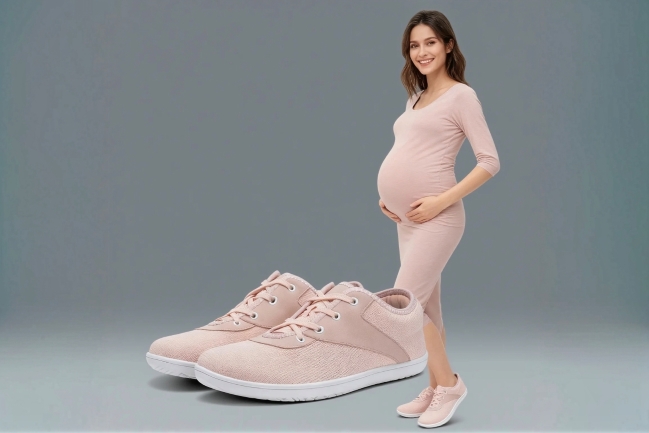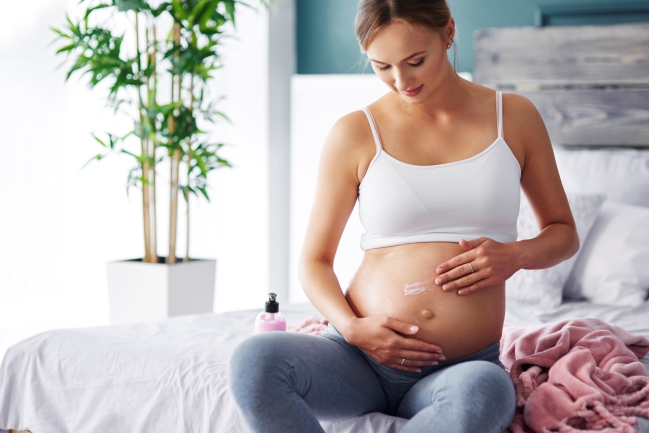Pregnancy is not merely a stage of physical change; it is also a period when the structure of the feet and the way they bear weight undergo significant alterations. As the fetus develops, the pregnant woman’s weight increases, and her lower limbs and feet have to bear greater pressure than ever before. This kind of pressure is mainly manifested as
Increased risk of arch collapse: Weight gain can cause the arch of the foot to bear a greater load, and some pregnant women may experience flat feet or sunken arches.
Edema and circulation problems: Common lower extremity edema during pregnancy can make the feet feel heavy and stiff easily.
Joint laxity: The secretion of progesterone makes ligaments and joints even more loose, which can easily lead to instability in the ankle or knee joints.
Posture change: The center of gravity of pregnant women gradually shifts forward. To maintain balance, the feet play a crucial regulatory role.
At such a stage, the choice of shoes becomes particularly important. Many people ask: Can pregnant women wear barefoot shoes?
Core Features of Barefoot Shoes
To answer this, let’s first look at what makes barefoot shoes unique:
Zero-drop sole
No elevated heel—your heel and forefoot stay at the same level, encouraging natural posture and reducing pelvic tilt.
Wide toe box
Allows toes to spread freely, which is especially helpful when feet swell during pregnancy.
Lightweight and flexible
Thin soles provide ground feedback, improving balance and stability.
Breathable materials
Many barefoot shoes are made from breathable fabrics, making them suitable for warm weather.
These features align closely with the needs of pregnant women’s feet, but let’s go deeper.
Potential Benefits of Barefoot Shoes During Pregnancy
Improve posture and reduce the burden on the waist and back
Back pain is a common problem in the middle and later stages of pregnancy. The zero-drop soles of barefoot shoes can help pregnant women maintain a posture closer to nature and reduce the pressure on their lumbar vertebrae.
Enhance balance and foot perception
After getting pregnant, the change of center of gravity can easily lead to unsteady walking. Barefoot shoes, with their design close to the ground, make the neural feedback in the feet more acute, thereby enhancing balance and reducing the risk of falls.
Relieve edema and compression
The wide toe and light body of the shoe avoid the drawback of excessive restraint in traditional shoes, allowing the feet to remain comfortable even when swollen.
Promote blood circulation
The lightness and flexibility of barefoot shoes facilitate the natural movement of the toes, thereby promoting blood flow and alleviating the common fatigue and numbness in the lower limbs of pregnant women.
Aid postpartum recovery
Developing good foot support habits during pregnancy can help the body structure return to normal more quickly after giving birth, especially in terms of the arch of the foot and gait.
Risks and Considerations
Despite these advantages, barefoot shoes are not universally suitable for all pregnant women:
Lack of prior experience: If you’ve never worn barefoot shoes before, pregnancy may not be the ideal time to start abruptly. Your foot muscles need time to adapt.
Surface safety: Thin soles expose feet to uneven or rough ground. For pregnant women, avoiding unstable surfaces is crucial.
Medical conditions: Those with severe flat feet, plantar fasciitis, or joint issues should seek medical advice before switching to barefoot shoes.
👉 Tip: Pregnant women who want to try barefoot shoes should start indoors or on smooth, safe surfaces, and gradually increase wear time.
Why Summer Is the Best Time to Try Barefoot Shoes
Natural foot expansion
Warm weather often causes feet to swell. A wide toe box and breathable materials provide extra comfort.Smooth transition
Summer footwear tends to be lighter. Switching to barefoot shoes feels more natural compared to heavy winter shoes.Better sensory experience
Daily light activity in summer—both indoors and outdoors—helps pregnant women adapt gradually.Moisture control
Pregnancy hormones increase perspiration. Breathable barefoot shoes reduce the risk of fungal infections and skin irritation.

Practical Guidelines for Pregnant Women
Choose the right model
Select barefoot shoes with slightly cushioned soles while maintaining flexibility.
Ensure the toe box is wide enough.
Prioritize soft, breathable fabrics.
Start gradually
Begin with 20–30 minutes at home per day.
Increase duration step by step.
Stick to flat, safe walking surfaces.
Wear appropriate socks
Light, breathable socks prevent friction and support circulation.
Combine with gentle foot exercises
Pregnancy yoga or simple toe-grip movements can help strengthen the feet.
Monitor your feet regularly
If swelling, pain, or discomfort worsens, reduce usage and consult your healthcare provider.
F&Qs
Question: Can one wear barefoot shoes in the early stage of pregnancy?
Answer: The early stage of pregnancy is an ideal time to start wearing barefoot shoes, allowing the feet sufficient time to adapt to the changes and prepare for weight gain later on.
Question: Can people with gestational diabetes wear barefoot shoes?
Answer: Yes, but special attention should be paid to foot health. Gestational diabetes may increase the risk of foot problems. The good blood circulation-promoting properties of barefoot shoes may actually be beneficial, but it is still recommended to consult a doctor.
Question: Can barefoot shoes prevent varicose veins during pregnancy?
Answer: Although it cannot be completely prevented, the characteristics of barefoot shoes in promoting the activity of calf muscles and blood circulation may help reduce the occurrence and severity of varicose veins.
Question: Can one still wear barefoot shoes after giving birth?
Answer: Of course you can. During the postpartum recovery period, barefoot shoes continue to provide support and comfort, especially suitable for standing or walking for a long time while carrying the weight of an infant.
Final Thoughts
So, can pregnant women wear barefoot shoes? The answer is: Yes, with the right approach and awareness.
Barefoot shoes can help reduce back strain, enhance balance, and relieve foot pressure. Summer provides the perfect opportunity to test them out thanks to breathable materials, natural comfort, and lighter activity routines.
However, adaptation should be gradual, safe, and mindful of individual health conditions. For expectant mothers, barefoot shoes are not just footwear—they can be a step toward natural movement and healthier living.
📩 Get in Touch
Looking for healthier footwear, or a partner interested in barefoot shoe solutions?
- 📧 Email: barefoot@jinchenshoes.com
- 📱 Phone / WhatsApp: +86 199 3076 5088
- 🌍 Website: www.jinchenshoes.com




